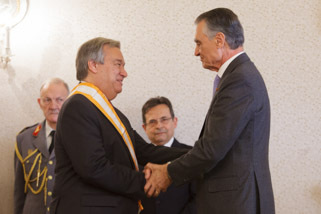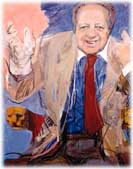
 Mário Alberto Nobre Lopes Soares
Mário Alberto Nobre Lopes Soares
Born in Lisbon on 7 December 1924.
Father: João Lopes Soares (Colonies Minister - 1925; owner of Colégio Moderno); Mother: Elisa Nobre Baptista.
Wife: Maria de Jesus Barroso.
Education: Colégio Moderno, 1935-1942; Lisbon University Arts Faculty, 1942-1951 (degree in History and Philosophy); Lisbon University Law Faculty, 1952-1957 (degree in Law).
CAREER
Profession: lawyer (since 1957).
Positions: Academic Direction of Young Communists of Lisbon (Direcção Académica das Juventudes Comunistas de Lisboa) (1944-45); president of the youth section of the Movement of Democratic Unity (Movimento de Unidade Democrática) (1945-1948); Secretary to General Norton de Matos (1949); Central Commission in support of Humberto Delgado (1958); ASP-Portuguese Socialist Action (Acção Socialista Portuguesa) (1964-1973); chief candidate of CEUD-Democratic Unity Electoral Commission (Comissão Eleitoral de Unidade Democrática) - Lisbon (1969); professor at the universities of Vincennes and Rennes (1970-1974); Secretary General of the PS (Socialist Party) (1973-1985); vice-president of the Socialist International (1974-1985); foreign minister (I-II Provisional Governments); minister without portfolio (III-IV Provisional Governments, 1974-1975); prime minister (I and II Constitutional Governments, 1976-1978 and IX Constitutional Government, 1983-1985); president of the Mário Soares Foundation (Fundação Mário Soares) and member of the Council of State (1996).
ELECTIONS AND PRESIDENTIAL PERIOD
On 26.1.1986 in the first round of the presidential elections Mário Soares got 25,43% (1 443 683 votes) against 46,31% (2 629 597 votes) Freitas do Amaral, 20,88% (1 185 867 votes) Salgado Zenha and 7,38% (418 961 votes) Lurdes Pintassilgo. Mário Soares was elected (51,18% - 3 010 756 votes) in the second round on 16.2.1986, defeating Freitas do Amaral (48,82% - 2 872 064 votes).
He was re-elected on 13.1.1991 (70,35% - 3,459 521 votes). The defeated candidates were Basílio Horta (14,16% - 696.379 votes), Carlos Carvalhas (12,92% - 635 373 votes) and Carlos Marques (2,57% - 26 581 votes).
He was President of the Republic from 9.3.1986 to 9.3.1996.
WORKS PUBLISHED
As Ideias Políticas e Sociais de Teófilo Braga, Lisbon, 1950; A Justificação Jurídica da Restauração e a Teoria da Origem Popular do Poder, Lisbon, 1956; Escritos Políticos, Lisbon, 1959; Le Portugal Baillonné, Paris, 1973; Portugal Amordaçado, Lisbon, 1974; Entre Militantes PS, Amadora, 1975; Escritos do Exílio, Amadora, 1975; Portugal's Struggle for Liberty, London; A Europa Connosco, Lisbon, 1976; Crise e Clarificação, Lisbon, 1977; O Futuro Será o Socialismo Democrático, Mem Martins, 1979.
He was an important opposition figure since the 40s. Son of João Soares, colonies minister of the I Republic who always encouraged Mário Soares’s political engagement. This explains why it took him almost ten years to get his first degree and a further seven until he was able to start practicing as a lawyer – an activity which was also markedly political – given his multiple political activities and corresponding periods in prison. His trajectory apart from the Communist Party - PCP - since 1950, combined with his international projection as the Delgado family lawyer after Humberto Delgado’s assassination (1965), consolidated by his deportation to São Tomé (1968-1969) and subsequent exile in Paris (1970-1974), lent him increased weight in the international socialist movement and drew the attention of the major foreign newspapers. It was in the Socialist International that he found the necessary means to found the Socialist Party PS (19.4.1973, Bad-Munstereifel, Germany).
He returned to Portugal after the 25 April Revolution and was welcomed in triumph at Santa Apolónia Station (28.4.1974). In the first legal congress (13 - 15.12.1974) he defeated the leftist current inside the PS and internally and externally began to concentrate the many forces that were determined to avoid the triumph of the PCP or the third world currents, a process that had its key moments: the victory of the PS in the elections for the Constituent Assembly (25.4.1975) and the first legislature (25.4.1976), the demonstration at Fonte Luminosa (2.5.1975), showing that the PS was the largest party both in terms of votes and in the street. The political and military process speeded up with the República case (19.5.1975); the "Documento dos Nove" (19.6.1975) and the departure of Soares and the remaining socialist ministers from the Provisional Government (21.6.1975) followed by the Social Democratic Party (PSD) ministers (23.6.1975); clearly with coordination between him and the moderate military (e.g. PS demonstration at Alameda on 23.11.1975) supporting the “Group of Nine".
Things returned to normal after 25 November 1975 and the election of Ramalho Eanes with the support of Soares and the PS; Eanes then designated Mário Soares as prime minister of the I (23.7.1976) and II Constitutional Governments (30.1.1978). This was the beginning of an increasingly tense political relationship which finally broke down in 1980 and Soares, who had been unable to convince the party leadership to withdraw their support for Eanes for a second term of office, suspended (19.10.1980 to 10.12.1980) his functions as secretary-general of the PS. The constitutional revision of the presidential powers which he promoted (12.8.1982) through PS-PSD-CDS, was his response to this problem. Soares also was prime minister of the “central bloc” government (June 1983) which ended the following the signing of the treaty that had been his major political project since 1976: joining the EEC (12.6.1985). The unpopularity caused by the policy of austerity during this period led:
His two terms in office were marked by so-called co-habitation i.e.: a socialist president and a PSD government, or to put it more specifically, by the political relationship between President Mário Soares with Prime-Minister Aníbal Cavaco Silva (1985-1995). The latter had been responsible for the fall of the “central bloc” and Freitas do Amaral’s supporter, which was hardly auspicious for a proper working relationship. However, when (3.4.1987) Cavaco Silva’s minority government fell, Soares, who was aware of Cavaco’s popularity and had no wish for a coalition government between the PS and the PRD (Democratic Renewal Party) which seemed fragile and might lead to charges of impartiality, called early elections (28.4.1987). These gave the PSD the first of two absolute majorities in Parliament. During the XI Constitutional Government, neither Cavaco nor Soares seemed to get involved in conflicts during what was a very favourable environment. Stability was important from the point of view of the elections both would soon be fighting. President Soares began his initiatives of the “Open Presidencies”, symbolically transferring the seat of the presidency to district capitals from north to south, with great popular and media success and where his empathy with the people and the media stand out, leading some people to criticize him as being on a sort of continuous election campaign. This first phase of relatively peaceful cohabitation deserved the support of the majority of voters so that the PSD gained a new absolute majority in the 1991 elections and Soares an overwhelming majority, with the support of the PSD, in the presidential elections of January 1991.
A more contentious phase in the cohabitation then began. President Soares could not be re-elected and his margin had been enormous and not the 2% of 1986. He was less conditioned in his role as “arbiter”. Events worsened, the economy went into a recession and social tensions rose, culminating in the gigantic protest of 25 de Abril Bridge called the “Buzinão” with drivers sounding their horns in unison (June 1994). The XII Constitutional Government reacted by reaffirming its authority in the face of what it considered to be illegitimate attempts to jeopardize it. President Soares said there were signs of worrying governmentalisation. Then, when the President of the Republic vetoed or sent to the Constitutional Court sensitive legislation - e.g. Law on Available Personnel (June 1992); the dismissals and asylum laws (August 1992) – the PSD considered it an undue way to block the Government’s actions. However, although dropping slightly, Mário Soares’s popularity in the polls was always high, as opposed to that of the Prime Minister and the Government.
Charges of interference came also from within the PS. When Victor Constâncio resigned as secretary general (October 1988) he said that Mário Soares had questioned his authority within the party. When Soares sponsored the conference "Portugal que Futuro?quot; in 1985 he was accused of endangering both the government and the then secretary general of the PS, António Guterres, allegedly trying to put pressure on Guterres to adopt a leftist strategy.
He was also criticised by what many considered his excessive visits abroad and their ostentation, although they were always a media success. These criticisms were counterbalanced by others concerning the fact that the Government did not make use of his international prestige.
When he left the presidency he had achieved the goal pursued by party leaders since 25 April: a parliamentary majority, a government and a president of the same leaning with the victory of the PS in the legislative elections (1.8.1995). He was succeeded by another socialist who took on much of his style of presidency: moderating and arbitrational power, above the parties. Soares was frequently described as “monarchical” because of his search for consensus and his taste for political rituals.
Having left the Presidency of the Republic (March 1996) Soares took over the presidency of the foundation bearing his name, which has certain similarities to American presidential libraries.
© 2006-2016 Presidency of the Portuguese Republic
You have gained access to the records of the Official Site of the Presidency of the Republic from 9 March 2006 to 9 March 2016.
The contents available here were entered in the site during the 10 year period covering the two mandates of President of the Republic Aníbal Cavaco Silva.